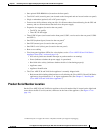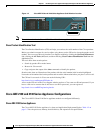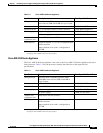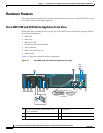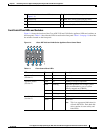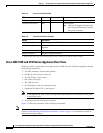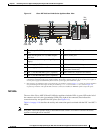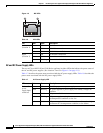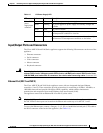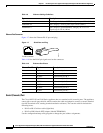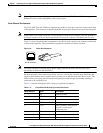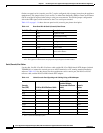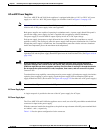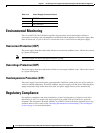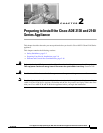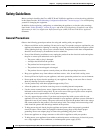
1-11
Cisco Application Deployment Engine (ADE) 2130 and 2140 Series Appliance Hardware Installation Guide
78-18579-02
Chapter 1 Introducing the Cisco Application Deployment Engine 2130 and 2140 Series Appliance
Hardware Features
Input/Output Ports and Connectors
The Cisco ADE 2130 and 2140 Series appliance supports the following I/O connectors on the rear of the
appliance:
• Ethernet connectors
• Serial connector
• Video connector
• Mouse connector
• Keyboard connector
Warning
To avoid electric shock, do not connect safety extra-low voltage (SELV) circuits to telephone-network
voltage (TNV) circuits. LAN ports contain SELV circuits, and WAN ports contain TNV circuits. Some
LAN and WAN ports both use RJ-45 connectors. Use caution when connecting cables.
Statement 1021
Ethernet Port (NIC 1 and NIC 2)
The Cisco ADE 2130 and 2140 Series appliance comes with two integrated dual-port Ethernet
controllers (1 and 2). These controllers provide an interface for connecting to 10-Mb/s, 100-Mb/s, or
1000-Mb/s networks and provide full-duplex (FDX) capability, which enables simultaneous
transmission and reception of data on the Ethernet local-area network (LAN).
The appliance comes with an Ethernet RJ-45-to-RJ-45 yellow cable.
Note (Optional) NIC ports 3 and 4 can be installed using a mezzanine module on the appliance. Additionally,
the NIC LEDs for these ports are located on the bottom and not the top as for the NIC 1 and 2.
To access the Ethernet port, connect a Category 3, 4, 5, 5E, or 6 unshielded twisted-pair (UTP) cable to
the RJ-45 connector on the back of the appliance. (See Table 1-9.)
Table 1-8 DC Power Supply LED
LED Color State Description
Below DC
power
supply input
connector
Off No DC input power to power supply
Green Blinking DC power applied to power supply and standby voltages are
available
Green Solid All power available
Amber Blinking DC power supply warning due to overcurrent or
overtemperature condition or slow fan
Amber Solid DC power supply failed or shut down due to blown fuse, high
overcurrent or overtemperature condition, or fan failure



